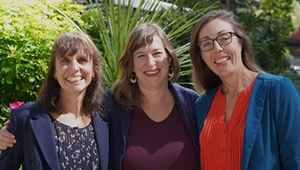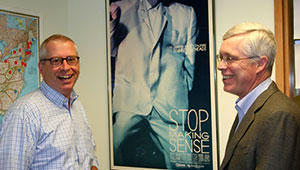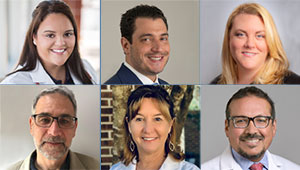How to become a clinical value champion

KPWHRI’s MacColl Center launches online training to help clinicians identify and curb overused services in clinical practice
Overuse of health care services is prevalent to some extent in every health care setting. These unnecessary, or “low-value,” services are those for which the potential for patient harm — physical, financial, or emotional — is greater than the potential for benefit. Examples of overused services include high-end imaging for acute low back pain, long-term opioid use for chronic pain, and antibiotics for viral upper respiratory infections. Taking action to address overuse is a health equity issue because of the greater potential for harm among medically vulnerable populations. This could include people who are marginalized because of race/ethnicity, income, geography, or a variety of other factors.
How can a health care organization start letting go of overused services that seem entrenched in clinical practice? One effective strategy is training “clinical value champions” — clinicians who act as change agents and engage their colleagues in efforts to identify and reduce overused services. The job of a clinical value champion is to share knowledge about the potential for harm from overuse, to provide feedback and facilitate conversations, and to serve as a role model for how to relinquish an overused service.
A new digital training course on how to become a clinical value champion is now freely available on Kaiser Permanente Scholar. Designed by KPWHRI’s MacColl Center for Health Care Innovation and funded by the Robert Wood Johnson Foundation (RWJF), the Value Champions Training Curriculum provides an online learning experience designed to prepare clinicians to play the important role of clinical value champion. Health care providers and health system leaders everywhere can use these new tools to train clinicians on how to start de-implementation projects and advance efforts to reduce medical overuse within their institutions.
Training value champions to ‘take action’ on overuse
The Value Champions Training Curriculum is based on the Taking Action on Overuse action-planning framework and Value Champions Fellowship led by KPWHRI Senior Investigator Michael Parchman, MD, MPH. Developed in 2017 by Dr. Parchman and his team at the MacColl Center, the Taking Action on Overuse framework provides a roadmap for addressing overused services through a detailed change package with key activities.
In 2019, the team took the work a step further with the launch of the Safety Net Value Champions fellowship, which trained 6 clinical value champions from across the country in how to use the action-planning framework. The fellows came from a diverse array of settings that serve medically vulnerable patients, and each was interested in advancing efforts to reduce medical overuse in their home institutions. Using the action-planning framework, they designed and implemented projects to tackle specific overuse issues, such as reducing overuse of opioids for chronic pain.
As a way to bring the collective learning from the fellowship to a wider audience, the faculty and fellows collaborated to develop the new Value Champions Training Curriculum, which includes 10 online learning modules and a project workbook.
The learning modules cover areas of knowledge that are foundational to becoming a clinical value champion, such as how to engage leadership, select an overused service to focus on, improve health equity by reducing overuse, and incorporate the patient’s perspective into efforts to reduce low-value care. Designed to emulate the learning process of lab courses, the project workbook guides users through the launch and implementation of an overuse-reduction initiative. Both tools include helpful case studies and lessons learned, along with resources from safety net settings and specific tips for improving health equity.
“Clinical value champions are a critical component of any effort to reduce medical overuse,” said Dr. Parchman. “We’re so excited to be able to offer this free training to any clinician who wants to be an active agent for change, and we’re grateful to RWJF for their support across the different phases of this project. We’re especially grateful to our 6 value champion fellows for their leadership and their willingness to share what they learned so others can benefit.”
In addition to Dr. Parchman, the Taking Action on Overuse team at KPWHRI’s MacColl Center includes Linda Kiel, Lorella Palazzo, Janna Webbon, and Jess Mogk. Other key contributors to the Value Champions Training Curriculum include:
- Our Value Champions fellows: Roberto Diaz Del Carpo, Lauren D. Demosthenes, Leslie Dunlap, George Hoke, Josh Moskovitz, and Elizabeth Vossenkemper
- Our Value Champions faculty: Scott Cook, Robert Fogerty, Reshma Gupta, Joshua M. Liao, John Mafi, Georges Potworowski, Kelly Rand, and Kathleen Reims
The Taking Action on Overuse team encourages the broad and free use of the Value Champions Training Curriculum. No permissions are needed. The program is covered by a Creative Commons License that only requires you to provide attribution to these original materials if you modify them and forbids anyone from charging or profiting financially from their use.
- Online Value Champions Training Curriculum posted on Kaiser Permanente Scholar
- PDF of training curriculum
- PDF of project workbook
ACT Center

New center focuses on equitable, whole-person health care
Kaiser Permanente launches the Center for Accelerating Care Transformation.
LOW-VALUE CARE

Start making sense: Taking Action on Overuse
MacColl and Robert Wood Johnson Foundation help providers and patients hold hard conversations to curb habits of too much testing and treatment
health services & economics

In health care, more isn’t always better. We know what to do less of, but how?
Our ‘Taking Action on Overuse’ framework helps organizations build a culture where care teams take ownership for reducing low-value care.
health services

Fellows launch 6 projects to reduce medical overuse
A new program aims to reduce unnecessary care for vulnerable patients such as back pain imaging and opioid use.


